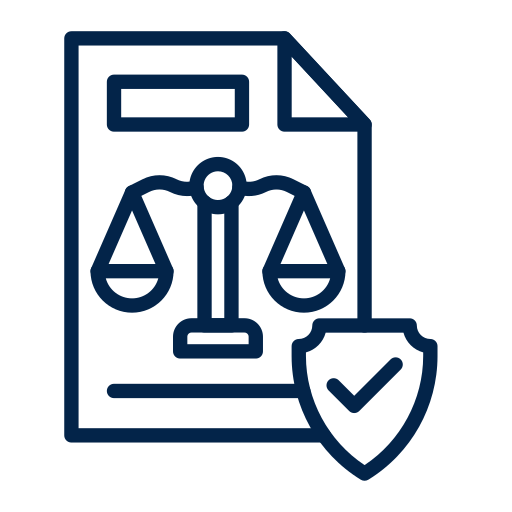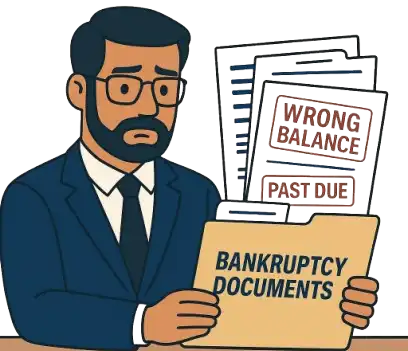Mixed Identity Errors on Credit Reports
Top Attorneys Helping Victims of Mixed Identity Credit Errors
4.7 / 5
Don’t let them get away with it, let us fight back for you
Wrong Information on Your Credit Report? It Could Cost You a Job — We Can Help
When someone else’s information appears on your credit report, it can damage your reputation, lower your credit score, and even lead to job denials. These mixed identity errors are more common than you think and they can have serious consequences.
Our attorneys fight for individuals who’ve been harmed by these reporting mistakes. If you’ve lost a job or faced financial loss due to inaccurate credit data, you may be entitled to compensation.
Credit reports are often used by employers to assess candidates especially for roles requiring trust and financial responsibility. But about 94% of background checks rely on third-party data, and when that data includes information from someone with a similar name or Social Security number, it can lead to serious mistakes.
These mixed identity errors can unfairly ruin your credit reputation and cost you job opportunities. When this happens, you may be entitled to legal remedies and compensation.
Common Issues with Mixed Identity Errors on Credit Reports
Incorrect or Confused Information
A frequent problem with credit reports is the presence of inaccurate or mixed-up information due to identity confusion. Examples include:
- Information from another person’s credit history being mistakenly included.
- Errors regarding the accuracy, completeness, or current status of the reported data.
- Assumptions that credit reporting systems are always error-free or updated promptly.
- False expectations that credit reports and related communications are free from technical glitches or data corruption.
At times, debts or accounts belonging to someone else may appear multiple times on a single report, unfairly inflating the perceived risk. Such errors can lead lenders or other institutions to deny credit or services without proper explanation.

Case Example – “Wrongly Marked as Risky Due to Mixed Identity”
Our client had a solid history of responsible credit use when a routine credit report was pulled. However, the report, generated by person, incorrectly included negative information from someone else’s credit file, falsely suggesting serious credit problems that did not belong to our client.
Credit Reports and Mixed Identity Errors
Inaccurate or Incomplete Reporting
- Confusion about the identity of the consumer, leading to data from another person’s credit file being reported.
- Assumptions that the credit reporting system is always accurate and up-to-date.
- Beliefs that the credit reporting service and its communications are free from errors, technical issues, or corrupted data.
Sometimes, the same negative information may appear multiple times, making the credit risk seem worse than it truly is. These errors can cause lenders to unfairly deny credit or services without providing a clear explanation.
Mixed Identity Errors on Credit Reports
Don’t let these mistakes harm your financial future — stand up and fight back with our help! We’re here to defend your rights and correct the errors holding you back. Take control today and let us fight for the credit report you deserve!
Inaccurate Credit Reporting Due to Mixed Identities
Inaccurate or Confused Reporting
A common problem with credit reports is the inclusion of incorrect or mixed information. For example:
- Confusion about the consumer’s identity causing data from another person’s credit history to appear.
- Assumptions that the credit reporting system is always accurate and up-to-date.
- Expectations that the credit reporting service, its databases, or communications are free from errors, technical glitches, or harmful data corruption.
Sometimes, the same inaccurate account or debt may be listed multiple times, unfairly worsening a person’s credit profile. Lenders may deny credit or services based on these errors, often without proper explanation.
Legal Remedies If Your Rights Are Violated
Lost Credit Opportunities Because of These Errors?
Don’t accept the consequences silently — let us help you fight back and restore your financial reputation!
Table of Contents
- Don’t let them get away with it, let us fight back for you
- Wrong Information on Your Credit Report? It Could Cost You a Job — We Can Help
- Common Issues with Mixed Identity Errors on Credit Reports
- Case Example – “Wrongly Marked as Risky Due to Mixed Identity”
- Credit Reports and Mixed Identity Errors
- Mixed Identity Errors on Credit Reports
- Inaccurate Credit Reporting Due to Mixed Identities
- Legal Remedies If Your Rights Are Violated
- Lost Credit Opportunities Because of These Errors?
From Our Clients
Highly professional, responsive and effective advocate. Very easy for me to recommend Haseeb Legal to my friends and family in need.

Feras Ahmed
Customers

Ali
Customers
Haseeb resolved my dispute quickly and professionally. Highly recommend him for anyone needing prompt, and expert legal assistance.

Asma Shaikh
Customers
Related Practice Areas
Get in touch
Office Location :
420 E Waterside Dr, Chicago, IL 60601
Follow our social media
FAQ Questions
Mixed Identity Errors on Credit Reports

If your credit report contains accounts, debts, or personal information that don’t belong to you, or if you’ve been denied credit or services due to inaccuracies, you likely have a valid claim to correct these errors.
Many attorneys work on a contingency basis, meaning you pay only if you win your case. Others may offer flat fees or hourly rates. It’s important to discuss fees upfront to understand what applies in your situation.
A lawyer can help you navigate complex credit laws, negotiate with credit bureaus and lenders, and ensure your rights are protected. They increase the chances of successfully correcting your report and seeking compensation if applicable.
Compensation varies depending on the impact of the errors on your financial life. It can include damages for lost credit opportunities, emotional distress, and legal fees, but every case is unique.
Fees can vary widely. Some attorneys charge nothing upfront and take a percentage of any settlement, while others bill hourly. Always clarify fee structures before hiring.
Legal experts understand the specific laws protecting consumers, such as the Fair Credit Reporting Act (FCRA), and can aggressively pursue corrections and damages on your behalf, helping restore your credit and financial reputation faster.
